[August-2019-New]Download 70-740 Dumps from Braindump2go(New Questions)
August/2019 Braindump2go 70-740 Exam Dumps with PDF and VCE New Updated Today! Following are some 70-740 Real Exam Questions:
1.|2019 Latest Braindump2go 70-740 Exam Dumps (PDF & VCE) Instant Download: https://www.braindump2go.com/70-740.html 2.|2019 Latest Braindump2go 70-740 Exam Questions & Answers Instant Download: https://drive.google.com/drive/folders/0B75b5xYLjSSNYXZ2ZlFjOHRhREU?usp=sharing NEW QUESTION
You deploy two servers that run Windows Server 2016.
You install the Failovers Clustering feature on both servers.
You need to create a workgroup cluster.
What should you do? A. Create matching local administrative accounts on both of the servers. Assign the same primary DNS suffix to both of the servers. Run the New-Cluster cmdlet and specify an administrative access point of None.
B. Configure both of the servers to be in a workgroup named Workgroup. Configure the Cluster Service to log on as Network Service. Run the New-Cluster cmdlet and specify an administrative access point of DNS.
C. Create matching local administrative accounts on both of the servers. Assign the same primary DNS suffix to both of the servers. Run the New-Cluster cmdlet and specify an administrative access point of DNS.
D. Configure both of the server to be in a workgroup named Workgroup. Configure the Cluster Service to log on as Network Service. Run the New-Cluster cmdlet and specify an administrative access point of None. Answer: B
Explanation:
https://rlevchenko.com/2015/09/07/workgroup-and-multi-domain-clusters-in-windows-server-2016/ NEW QUESTION
Note: This question is part of a series of questions that present the same scenario. Each question in the series contains a unique solution that might meet the stated goals. Some question sets might have more than one correct solution, while others might not have a correct solution.
After your answer a question in this section, you will NOT be able to return to it. As a result, these questions will not appear in the review screen.
Your network contains an Active Directory forest named contoso.com.
You need to identify which server is the schema master.
Solution: From a command prompt, you run netdom query fsmo.
Does this meet the goal? A. Yes
B. No Answer: A
Explanation:
https://blogs.technet.microsoft.com/mempson/2007/11/08/how-to-find-out-who-has-your-fsmo-roles/ NEW QUESTION
Note: This question is part of a series of questions that use the same scenario. For your convenience, the scenario is repeated in each question. Each question presents a different goal and answer choices, but the text of the scenario is exactly the same in each question in this series.
Start of repeated scenario
Your network contains an Active Directory domain named contoso.com. The functional level of the forest and the domain is Windows Server 2008 R2. All servers in the domain run Windows Server 2016 Standard. The domain contains 300 client computers that run either Windows 8.1 or Windows 10.
The domain contains nine servers that are configured as shown in the following table.
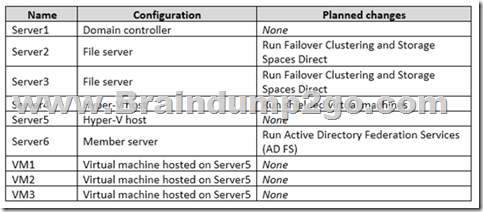
The virtual machines are configured as follows:
- Each virtual machine has one virtual network adapter.
- VM1 and VM2 are part of a Network Load Balancing (NLB) cluster.
- All of the servers on the network can communicate with all of the virtual machines.
End of repeated scenario.
You plan to implement nested virtual machines on VM1.
Which two features will you be prevented from using for VM1? A. NUMA spanning
B. Smart Paging
C. Dynamic Memory
D. live migration Answer: CD
Explanation:
https://blogs.technet.microsoft.com/pracheta/2014/01/22/numa-understand-it-its-usefulness-with-windows-server-2012/
https://blogs.technet.microsoft.com/virtualization/2015/10/13/windows-insider-preview-nested-virtualization/ NEW QUESTION
Your network contains an Active Directory domain named contoso.com.
The domain contains two servers named Server1 and Server2 that run Windows Server 2016.
Each server has an operating system disk and four data disks.
All of the disks are locally attached SATA disks. Each disk is a basic disk, is initialized as an MBR disk, and has a single NTFS volume.
You plan to implement Storage Spaces Direct by using the data disks on Server1 and Server2.
You need to prepare the data disks for the Storage Spaces Direct implementation.
What should you do? A. Convert the data disks to dynamic disks.
B. Format the volumes on the data disks as exFAT.
C. Initialize the data disks as GPT disks and create an ReFS volume on each disk.
D. Delete the volumes from the data disks. Answer: D NEW QUESTION
You have two servers named Server1 and Server2.
A firewall exists between Server1 and Server2.
Both servers run Windows Server Update Services (WSUS).
Server1 downloads updates from Microsoft update.
Server2 must synchronize updates from Server1.
Which port should to open on the firewall? A. 80
B. 443
C. 3389
D. 8530 Answer: D NEW QUESTION
Drag and Drop Question
You have a file server named Server1 that runs Windows Server 2016.
You need to create a report that lists all of the sharp permissions assigned to the security principals on Server1.
How should you complete the command? To answer, drag the appropriate cmdlets to the correct targets. Each cmdlet may be used once, more than once, or not at all. You may need to drag the split bar between panes or scroll to view content.
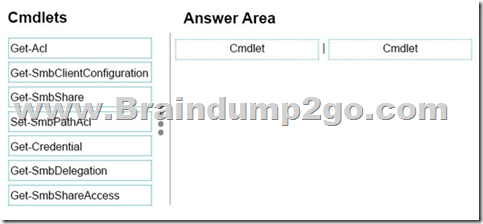
Answer:
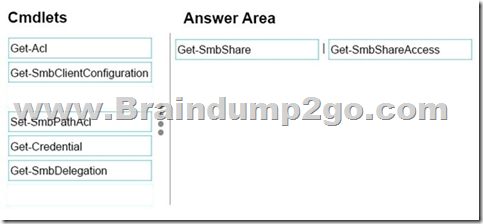 NEW QUESTION
Drag and Drop Question
Your network contains an Active Directory domain named contoso.com. The domain has two clusters named FC1 and FC2.
The domain contains servers that run Windows Server 2016. The Servers are configured as shown in the following table.

Server1 hosts a highly available virtual machine named VM1.
You need to move VM1 from Server1 to Server3 by using live migration.
Which three actions should you perform in sequence? To answer, move the appropriate actions from the list of actions to the answer area and arrange them in the correct order.
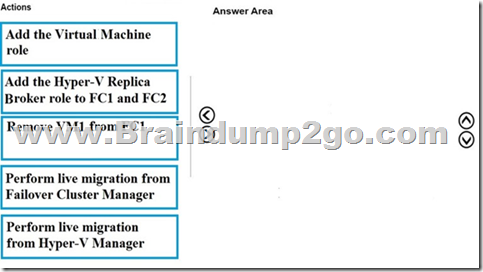
Answer:
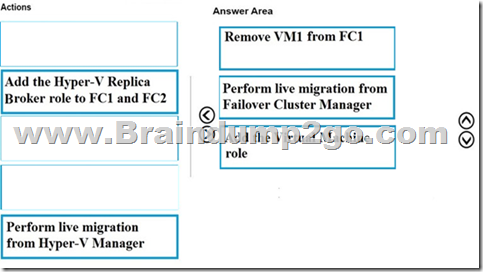 NEW QUESTION
You have a server named Server1 that runs Windows Server 2016. Windows Defender is enabled on Server1.
Server1 runs an application named App1 that stores various types of files in Microsoft OneDrive for Business, MicrosoftOneDrive, and Microsoft SharePoint Online. App1 also interacts with several local services.
You need to prevent Windows Defender from scanning any files opened by App1.
What should you do on Server1? A. Modify the real-time protection settings in Windows Defender.
B. Modify the cloud-based protection settings in Windows Defender.
C. Run the New-AppLockerPolicy cmdlet.
D. From the Windows Defender settings, configure a process exclusion. Answer: D NEW QUESTION
Hotspot Question
Your network contains an Active Directory domain named contoso.com. The domain contains three clusters named FC1, FC2, and FC3.
The domain contains servers that run Windows Server 2016. The servers are configured as shown in the following table.

Server1 hosts a highly available virtual machine named VM1.
You are creating a maintenance plan for the servers, and you are evaluating how to move VM1 to the different clusters.
You need to identify the fastest method to move VM1 to FC2 and FC3.
Which method should you identify for each cluster? To answer, select the appropriate options in the answer area. NOTE: Each correct selection is worth one point.
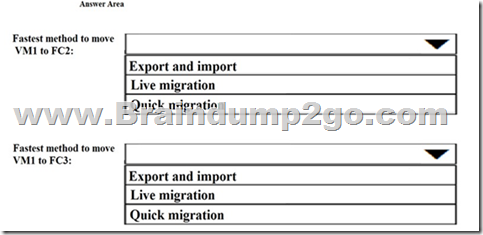
Answer:
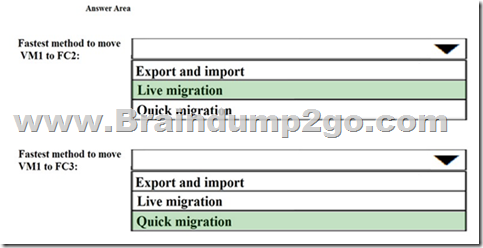
NEW QUESTION
Your network contains an Active Directory domain. The domain contains a new file server named Server1 that runs a Server Core installation of Windows Server 2016.
Server1 has an ReFS-formatted volume D: and NTFS-formatted volume E:.
The volumes do not contain any data.
You install the Data Deduplication role service on Server1.
You need to implement Data Deduplication for volumes on D: and E:.
Solution: From Windows PowerShell, you run Format-Volume D: -FileSystem EXFat and Enable-DeDupVolume -Volume D:,E:.
Does this meet the goal? A. Yes
B. No Answer: B NEW QUESTION
You have two servers named Server1 and Server2 that run Windows Server 2016.
You plan to implement Storage Replica to replicate the contents of volumes on Server1 to Server2.
You need to ensure that the replication traffic between the servers is limited to a maximum of 100 Mbps.
Which cmdlet should you run? A. New-NetQosPolicy
B. Set-NetworkController
C. New-NetTransportFilter
D. New-StorageQosPolicy Answer: A
Explanation:
https://technet.microsoft.com/en-us/library/hh967471(v=wps.630).aspx
!!!RECOMMEND!!!1.|2019 Latest Braindump2go 70-740 Exam Dumps (PDF & VCE) Instant Download: https://www.braindump2go.com/70-740.html 2.|2019 Latest Braindump2go 70-740 Study Guide Video Instant Download: YouTube Video: YouTube.com/watch?v=mh7SB9F6T7I
|








